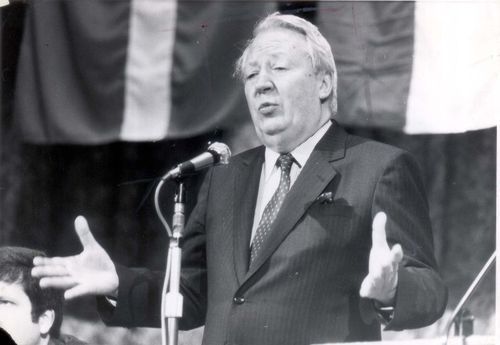A demonstration of powerlessness
In my Trotskyist days, I recall, one of our smarter senior comrades once sneered at elaborate plans we were all making for some demonstration. I think it was the TUC's enormous march against Ted Heath's industrial relations laws in (was it?) 1971, around the time the currency went decimal. We were all excitedly booking coaches, making placards, dreaming up slogans and generally getting ourselves into a state of heightened revolutionary fervour.
'Demonstrations are demonstrations of impotence', he intoned. 'If you need to show your support by shambling through central London for hours in the cold, then you plainly don't have any real power. You never see demonstrations by the British Road Federation (in those days the major lobby for motorway building) , do you? And when I do see such a demonstration, then I'll look out for a major expansion of the railways'.
His words spoiled the occasion for me, because they were so obviously true. But in those days I liked demonstrations for their own sake. They appeal to the boy scout in all of us, in the same way that muddy pop festivals do today. Togetherness, shared discomfort, a feeling of being a part of something bigger than yourself, are all rather enjoyable. Not to mention the self-righteous feeling of parading your certainties.
I'd been on lots - a rather small CND Easter march against the Bomb in 1966, a pale shadow of the original Aldermaston marches of the early sixties, an even smaller procession through drenching, freezing rain (I've never been so wet before or since) to the Polaris warhead factory at Burghfield outside Reading, several Vietnam War demonstrations, including the astonishingly violent and bitter one outside the American Embassy in March 1968, and the celebrity replay (do I recall Vanessa Redgrave in a headband, or is it my imagination?) in October of the same year. Then there was the protest against Enoch Powell in Oxford, where I led a charge against the Oxford constabulary outside the Town Hall, and was appalled and flummoxed when their line broke and the way into the hall was open. I didn't know what to do next - another telling realisation that helped me, ever so slowly, to think my way out of leftist politics. But that was also before I badly injured myself in a motorbike accident, an event that robbed me of much of the physical bravado I'd had before, and also began a long, long process of thought that eventually helped me grow up.
Then there was the protest against the Bloody Sunday massacre in York in 1972 - one of the few that I don't really regret. Our behaviour was a bit over the top, and I don't defend that, but the shooting of several fellow-subjects of the Queen by our own armed forces was a grave event( and a major political error , too). If we hadn't protested, we'd have been neglecting our civic duty. Not that it did any good.
Talk about governments killing their own people.
But I think the last I attended was a counter-march directed against the National Front in Leicester. They were trying to stir up trouble over the admission of Asian refugees, fleeing from racial bigotry in East Africa. We were trying to make left-wing capital out of that. It was thanks to that particular march that I found out what the words 'laughed off the stage' actually mean (just as,. years later,, I would understand the expression 'I wished the ground would swallow me up', but that's another story).
I made a speech at the York Students' Union in which I tried to link the Leicester affair with a dock strike we were then busily supporting ( If you held a strike of any kind in those days, you had to fight off eager Trotskyists coming to help you) .
There was no link at all (except our Bolshevik opportunism) and I stumbled. Someone called out accurately from the back of the room 'There are no docks in Leicester!', and I was , yes, laughed off the stage. Ouch. I can't recall going on any marches after that, but I think I've done my share.
Two things come to mind. One that in those days the media were pretty much universally hostile or indifferent. The crustier and more port-inflamed pundits of the Daily Telegraph would come out on to the balcony of their Fleet Street building to jeer as we went by, and we would merrily jeer back at them. Only the Communist 'Morning Star' (which nobody read and which we derisively referred to as 'the Daily Employee' because of its cowardly decision to stop calling itself 'The Daily Worker') would mention most of these things at all. TV might show a few seconds.
The sort of friendly, prominent and sympathetic coverage given to the TUC march by the BBC on Saturday would have been unthinkable.
Two, that most of the causes we marched for triumphed in the end, but not because we marched on the streets. They triumphed because the university generation of 1967-73 went on to work in the media, teaching, the law, the police, the church and the civil service, and marched instead through the institutions. And in many ways the less noise they had made in the raucous days of Grosvenor Square and Ho! Ho! Ho chi Minh!, the more effect they eventually had. I was amused to discover, a couple of years ago, that among my fellow-marchers on March 17 1968, protesting against America's conservative war in Vietnam, was one John Scarlett, who would become the head of MI6 and be central to Britain's liberal war on Iraq. I find this a very telling fact.
Peter Hitchens's Blog
- Peter Hitchens's profile
- 297 followers




